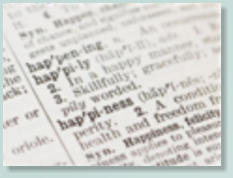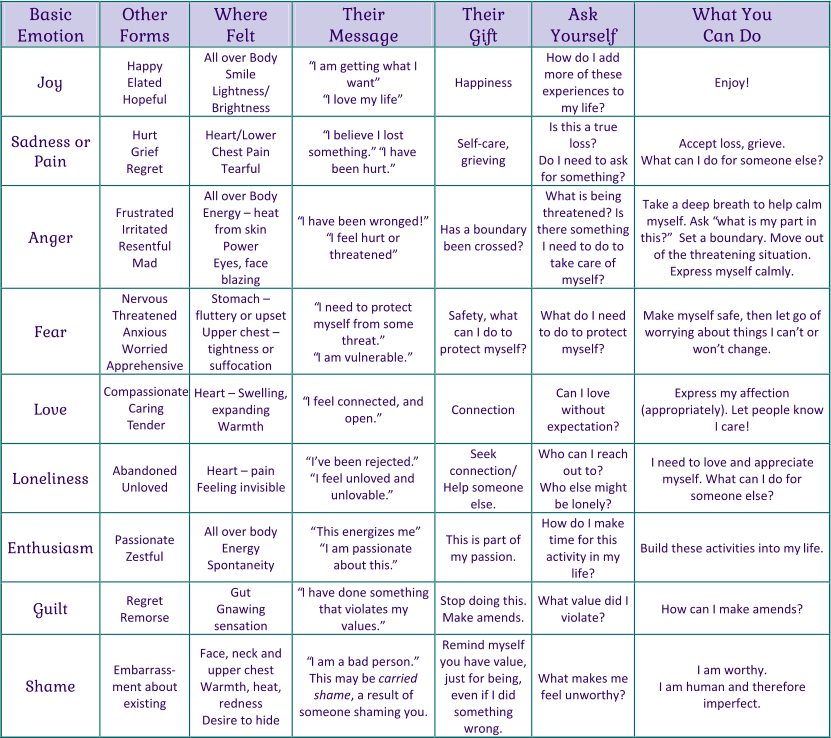

UNDERSTANDING EMOTIONS
Messages and Gifts
Happiness – “1. the quality or state of being happy. 2. good fortune; pleasure; contentment; joy.” I believe our natural state is to be happy and have a sense of inner peace. However, things happen in our lives, which we interpret to create emotions other than happiness, and those feelings block us from experiencing our natural serene state. Paying attention to those feelings, and understanding the stories that lead to them provides the freedom to transform them, removing that impediment to our happiness. Our emotions are messages to us. Each has a gift. When we get a feeling that bothers us, it is important to recognize the emotion and investigate what is behind it. If feelings are recognized and honored for the message they bring, they can pass through us, having fulfilled their function. Many of us are not good at recognizing when we have a feeling, so we don’t even realize we need to look at what is happening to create it. If we don’t pay attention to our feelings as they are triggered, they get all rolled together inside us and we begin to feel anxious or depressed, and we can get stuck in these unpleasant emotions. Feelings are internal, although there are some facial expressions and behaviors that are widely recognized to express certain feelings. The challenge is that some families help us label and understand feelings less well than others, so we don’t know how to identify what we are feeling. And sometimes parents deny the feelings that our expressions or behavior indicate are happening. Many families are not comfortable with all feelings. Some of us grew up in families where certain feelings were not allowed. In some families you can be happy, but not sad. In other families, being happy is threatening, but sadness is expected. In my family expressing anger was interpreted as being crazy.Core Feelings
Identifying your feelings is the first step on the Path to Happiness and many of us need help in recognizing our feelings. Here are some “core” emotions that you can use to figure out what you are feeling (adapted from The Meadows codependence recovery model). The quoted definitions are from Random House Dictionary of the English Language. Listed with each emotion are some clues to what the message behind the feeling may be. At the end of this page is a matrix of these emotions, their messages, their gifts, and healthy ways to respond to them. Our feelings are valuable tools in our lives and relationships if we learn to recognize them quickly and interpret and respond to their messages. Joy – “the emotion or great delight or happiness caused by something good or satisfying; keen pleasure.” We can increase our joy by noticing good things, and being grateful, and not setting the requirements for happiness and joy too high. The message of joy is “how do I find more.” Paying attention to what is happening when you feel joy gives us clues about things we should do more often in our lives. The pleasure you feel watching a beautiful sunset on vacation can remind you to go outside around the time the sun sets wherever you are. Sadness or pain – sorrow “a distress caused by loss, affliction, disappointment, etc.; grief, sadness or regret.” The message is “I believe I lost something,” or “I have been hurt.” When you feel sad or hurt, ask yourself, “Is this a true loss? Or one I believe I have suffered or am afraid of suffering, or something I interpret as a loss because I set an unrealistic expectation?” If it is a true loss, and not something you can recover (and life is filled with these), accept the loss, let yourself feel it and grieve it. Appreciate and celebrate what you had, mourn that it is gone, and move on. Other times, you may feel a loss, but you can still ask for what you want, so communicate. Ask for what you want, and accept what you receive, and if you believe you will get what you need, you will. Sadness can result from ignoring our other feelings, from not taking action on the message that we are supposed to be getting from those feelings, and it can grow into depression. Anger – “a strong feeling of displeasure and belligerence aroused by a real or supposed wrong.” Someone or something has lead to you feeling hurt or threatened (sadness or fear). Physically there is a release of adrenaline and you might feel heat from your skin, as well as a burst of strength. It can be hard to focus on anything other than the object that aroused you. It is helpful to take a deep breath before responding when you feel angry. Message – is there something you need to do to take care of yourself? Is someone trying to hurt you? Or is it a belief about someone not respecting you that is really the culprit? Figure out what you need to do to protect yourself, and do it. Do you need to communicate with someone about what is making you are feeling hurt or threatened? If so, say, “When you said (or did) …, I interpreted it to mean … and I felt hurt and angry.” Frustration is often a low level of anger, resulting from your expectations not being met. Unrecognized anger leads to physical problems and unhappy relationships as well as to depression and anxiety. Fear – “a distressing emotion aroused by an impending pain, danger, evil, etc. or by the illusion of such.” Fear can be useful in telling you there is a threat. It can also result from a belief that interprets threats where there isn’t any physical danger (acrophobia in a tall building, or a fear of making a fool of yourself when speaking in front of a group). Ask yourself, “What if the worst happened?” Imagine it. What would you do? Would you survive? What if you didn’t? Is there anything you can do to make the potential outcome better? If so, do it. If not, why reduce today’s happiness by worrying about something you can’t control happening in the future? Irrational fear is pervasive in most lives today. Our big fears are of not having enough, and of not being enough, and of course, the fear of dying. Great tools for the irrational fears are love, gratitude and giving of yourself. Some attitudes that reduce fear include: believing that you are all you need, you are worthy, lovable, and valuable; and realizing that happiness doesn’t come from how much you have, but from being satisfied with what you have. Love – “a profoundly tender, passionate affection,” “a feeling of warm personal attachment or deep affection,” or “affectionate concern for the well-being of others.” In all its forms, love feels good! Feeling love emanating from our hearts and beings toward others is a great source of happiness. When people ask whether it is better to love or be loved, I respond that since loving is in our control, I think it is better to love. Cultivating the ability to feel love toward others, even those who can be challenging for us, is a practice that increases your happiness. Loving kindness mediations are one way to do this, as is choosing to accept that we are all imperfect and worthy of love. Feeling love and compassion toward someone, or humanity in general, helps us feel connected to others, which seems to be a basic human need. It is important to love ourselves as well as others. Brené Brown says that we cannot be truly compassionate to others unless we are compassionate to our selves. Loneliness – “destitute of sympathetic or friendly companionship or relationships.” Fear of being alone is a very powerful feeling that erupts whenever we believe we have been or may be rejected. It often occurs when we interpret another’s actions as meaning they don’t like us. Everyone I have talked to has experienced a feeling that they don’t belong – whether it was in the junior high lunchroom, or not having a boyfriend or girlfriend, or believing no one appreciates and loves you. If we love and appreciate ourselves, and learn to enjoy our own company, we don’t have to fear being alone. Recognizing that others feel insecure at times can remind you that you always have the option of reaching out to another person who is alone, or join a group, rather than feed your suspicion that no one likes you. Enthusiasm – “lively, absorbing interest; excited involvement.” This is the feeling of being ‘lit up’ with excitement and energy for something you are doing. Enthusiasm describes what we are experiencing when we are so engaged in what we are doing we lose track of time, and may even forget to eat a meal. Mihalyi Csikszentmihalyi calls this state ‘flow’ and he posits it is an important factor in a life of meaning and happiness. Noticing the times you feel enthusiasm is a great guide for activities you should make more time for in your life. Guilt and regret – “the fact or state of having committed an offense, crime, etc., especially against moral or penal law; culpability, a feeling of responsibility or remorse for some real or imagined offense, crime, etc.” Physically you might experience a desire to be small, or go back in time for a “re-do” and you might feel a blush on your face. The message is that you violated your values. This is usually a feeling about an action (or lack of action), but it can be about thoughts. You may have crossed a boundary and may have hurt or imposed on someone else. When you feel this, ask if you may have caused offense. You may need to check it out with others. Then is it possible to make amends (admit what you did, ask forgiveness)? Can you forgive yourself? Or are you assuming responsibility for something that isn’t in your control? Shame – “the painful feeling arising from the consciousness of something dishonorable, improper, ridiculous, etc., done by oneself or another” “shame is a painful feeling caused by the consciousness or exposure of unworthy or indecent conduct or circumstances: One feels shame at being caught in a lie.” Physically it can feel like wanting to shrink away, be invisible, or curl up into oneself. Shame is feeling unworthy or not good enough, more for who you are than for something you have done. This feeling is often a signal that you have beliefs of not being worthy or that you think you have to be perfect. Since perfection is a standard fallible humans can’t meet, it sets one up to experience shame about not being good enough. The message is to look at your beliefs about yourself and accept your imperfections, and to consider believing that all humans are worthy of love and respect, including yourself. Some of us feel shame as a result of what other people have done – victims of childhood sexual abuse, or domestic violence, or children of addicts can all experience carried shame. It is a result of feeling the abuse was your fault, or being expected to keep a secret. Addiction circles have a saying, “You are as sick as your secrets.” Secrets, whether your own or someone else’s, can create shame. The message here is to give back the shame to the person who didn’t respect you, and to forgive yourself for keeping the secret, or for not being able to protect yourself or another. If all you can identify is anxiety, you need to learn to figure out which of the above feelings underlies the anxiety, so you can figure out what approach will resolve the feeling. David Lykken, the researcher most often cited regarding a “happiness set point,” later identified these frequent “thieves” of happiness: depression, fear, shyness, anger and resentment. If we arrest these thieves when we notice their interference with our happiness, and take action to address them, our happiness increases. Once you identify that an uncomfortable feeling is occurring, there are questions to ask yourself. Is there something about the situation that needs to change? Is there danger, or has someone hurt you? Is there some action you need to take to protect yourself? What beliefs about ourselves, or the situation or the world are we using to interpret what has happened? Once we identify beliefs that are connected to our feeling, we can question the truth of them, and whether they serve us. Then we can look for alternative beliefs that can lead to a different feeling.Identifying Emotions
The matrix below is designed to help you recognize your feelings, the messages that underlie the feelings, the gift of the emotion, and what you can do in response to the feeling to honor it, and to shift it.
Choose to be happier!
You have found the place
to learn what YOU can do
to have a happier,
more fulfilling life!


© Molly L. Stranahan, Psy.D. 2022





Subscribe to our Newsletter

























